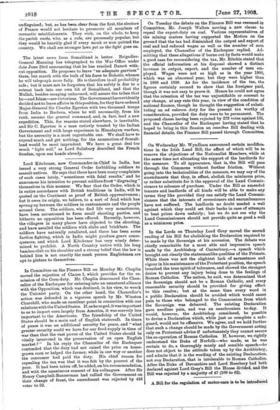In Committee on the Finance Bill on Monday Mr. Chaplin
moved the rejection of Clause 1, which provides for the re- mission of the Corn-duty. Mr. Chaplin denounced the Chan- cellor of the Exchequer for entering into an unnatural alliance with the Opposition, which was destined, in his view, to wreck the Unionist party. On the other hand, the Chancellor's action was defended in a vigorous speech by Mr. Winston Churchill, who made an excellent point in connection with our relations with the United States. If, as he urged, it was important to us to import corn largely from America, it was scarcely less important to the Americans. The friendship of the United States should be a main end of English statecraft. In times of peace it was an additional security for peace, and " what greater security could we have for our food-supply in time of war than that the vast power of the United States should be vitally interested in the preservation of an open English market ? " In his reply the Chancellor of the Exchequer contended that the duty had not raised the price on home- grown corn or helped the farmer, while in one way or another the consumer had paid the duty. His chief reason for repealing the tax was that it was felt by the poorest of the poor. It had been taken off, he added, on his recommendation, and with the unanimous consent of his colleagues. After Sir Henry Campbell-Bannerman had rallied the Government on their change of front, the amendment was rejected by 416 votes to 32.






















































 Previous page
Previous page